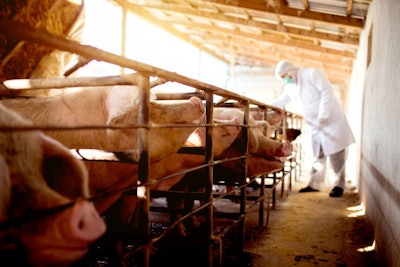
In Thailand, African swine fever appears to be spreading rapidly across the country, prompting action and spending on disease controls from the government.
As African swine fever (ASF) spreads across Thailand, the government is making greater efforts to control the disease.
Originally earmarked as an emergency budget, THB2.9 billion (US$87.3 million) has been allocated by the agriculture ministry to contain ASF, reported The Thaiger last week. A member of the One Move Forward Party alleged that the infection is more widespread than the authorities report. The discrepancy is attributed to the fact that, in some cases, pigs die before official samples can be taken for testing.
ASF virus is not transmissible to people, according to the same source. Later this week, it reports, Thai authorities will meet with those in China and Vietnam to find out how those nations have defended against ASF in the past.
In recent days, Reuters reported that Thailand’s pig farmers are angry about the spread of ASF. One owner alleged that no testing was carried out when dozens of their pigs died two years ago.
However, a senior official at the Bureau of Disease Control and Veterinary Services asserted that none of the country’s pigs tested positive for the ASF until two months ago. This is despite testing of around 300,000 pigs culled due to a high risk of the disease between 2019 and 2021.
Outbreaks confirmed in 12 Thai provinces
First ever ASF cases in Thailand occurred in November 2021. Officially registered with the World Organisation for Animal Health (OIE) in January, these involved three pet pigs in the capital city, Bangkok, and some samples from a slaughterhouse in the neighboring province, Nathom Pathom.
The number of confirmed outbreaks in the country stands at 19, according to the latest notifications to the OIE. One or more ASF cases have been detected in village herds in 12 more provinces in southern central, eastern and northwestern Thailand. Some of these provinces border Cambodia or Myanmar, where ASF cases have been reported in recent years.
Just over 600 pigs in Thailand are reported to have been directly involved in the outbreaks so far.
Update on ASF in the Philippines
Cases of ASF continue to be reported in the Philippines, after the initial outbreaks confirmed in July 2019.
Threat of the disease has been contained in General Santos City, reports Philippine News Agency (PNA). This came after the first ASF outbreak “for years” in late January. Located on the south of the island of Mindanao, the city is in South Cotabato province in the Soccsksargen region. Veterinary authorities in the region have called for biosecurity and quarantine measures to be tightened.
Meanwhile, cases have recently been detected in 33 villages in the neighboring province of North Cotabato, according to PNA. In the far west of the island, Zamboanga province has been declared free of ASF.
Over the past few days, authorities in the Ilocos region on the island of Luzon have announced the next step in the repopulation of Pangasinan. In this province, a program will soon start to test whether the ASF virus has been eliminated. PNA reports that a small number of pigs will be used at selected locations as part of a sentinel program.
Further cases in northeast India
Last month, ASF was reported in “many districts” of the state of Nagaland, according to NewsTrack. Outbreak locations were identified as in Mokukchung and Phek districts.
Officials are warning local pig farmers and traders to be vigilant, and report any signs of the illness in animals to the local veterinary institute.
India’s ASF outbreaks began in the northeast of the country in 2020. Since then, sporadic outbreaks have been reported in a number of states in that region.
ASF situation in domestic pigs elsewhere in Asia
In Malaysia, further cases of ASF have been detected in three states.
In mid-January, Borneo Post reported a confirmed outbreak in Penampang. This brought to 20 the number of districts affected by the disease in Sabah. Located on the island of Borneo in Eastern Malaysia, the country’s first ASF cases were reported in this state one year ago. In the neighboring state of Sarawak, more than 200 pigs have recently been culled to control the spread of infection.
Meanwhile, in Malacca state in Western Malaysia, more than 1,800 pigs have been culled. The move comes after outbreaks at 16 farms in the area, according to the United Nations’ Food and Agriculture Organization (FAO).
In Russia’s eastern territories, further cases of ASF in domestic pigs have been confirmed. According to the latest OIE notifications, affected was a backyard herd of around 80 pigs in the Sverdlovsk region of the Urals federal district. Four more cases were identified at a previous outbreak location in Amur region, which is in the Far Eastern federal district.
3 countries in Asia register new outbreaks in wild boar
After a four-month hiatus, ASF has been detected again in wild animals in Hong Kong.
According to OIE reports, one out of six wild boar carcasses tested positive for the virus in mid-January. Near the village of Wong Yue Tan in the New Territories, sampling was carried out after abnormal mortality was reported in the area. While there are no pig farms within 3 kilometers of the village, the authorities continue to monitor unusual mortalities in wild and domestic pigs.
In Russia’s Far East federal district, ASF has been detected again in the Primorsky region. Affected were eight wild boar found dead at one forest location. In Amur, a further 18 wild boar have tested positive for the virus since mid-January.
Number of ASF-infected wild boar in South Korea stood at 1,965, according to the FAO (as of January 20).
Officials believe infection is spreading in these animals in a southwesterly direction through the mountains, FAO notes. In response, authorities in the country have announced a new program that aims to reduce the wild population significantly by next month.
Emerging ASF viruses in China
Recently published research indicates that two ASF virus “families” are circulating in pigs in China. Since 2018, the highly virulent genotype II virus has been prevalent in the country. However, research at the Harbin Veterinary Research Institute has revealed the presence of two genotype I viruses on farms in the provinces of Henan and Shandong.
According to Encheng Sun and others in a paper in Emerging Microbes and Infections, the emergence of the new viruses could increase the challenges of controlling ASF in future.
The Shandong variant showed low virulence but was highly transmissible between pigs. Symptoms were mild, long-lasting, and included skin lesions and joint swelling. This contrasts with the Henan variant, which was obtained from an animal suffering apparent paralysis.
While genetically different from one another, both the new variants appear to have originated from a virus found in Portugal in the 20th century.
View our continuing coverage of the global African swine fever situation.


















